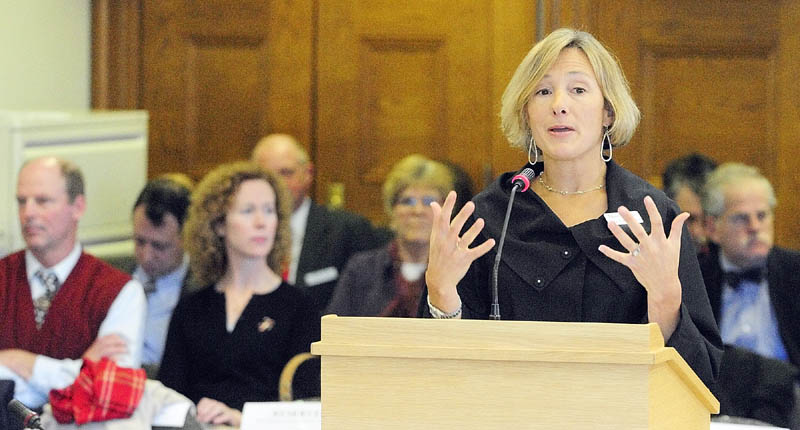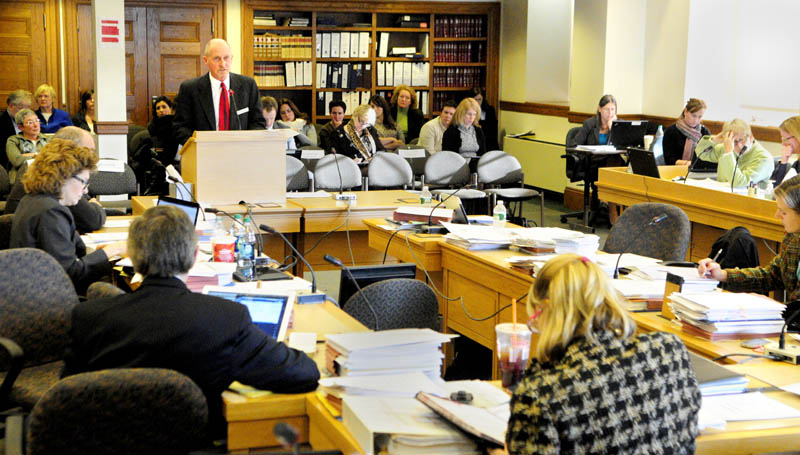AUGUSTA — Keeping students away from alcohol, drugs, junk food and stress is an important service provided by school health centers, Maranacook High School senior Christian Wick said Friday.
Wick and other high school students came to the State House for the final day of hearings on Gov. Paul LePage’s proposal to close a $221 million gap in the state Department of Health and Human Services. At a morning press conference, Wick said the 16 school-based health centers, which would lose 66 percent of their funding under LePage’s plan, gives students quick access to help.
“Students can get health care when they need it, at school, before problems become more serious,” he said.
In 2013, the state will have $54 million in tobacco settlement money, which comes from tobacco companies that were sued by 46 states in 1998. The states wanted money to help cover the cost of “health related expenses caused by smoking tobacco,” according to a recent analysis of the fund.
In 1999, the Legislature approved eight categories in which the money can be spent, including smoking prevention and cessation, prenatal and young children’s care, child care, prescription drugs for the elderly or disabled, dental and oral health care for the poor and school-based health centers.
LePage is proposing to take $29 million out of the fund in 2013 and move it to MaineCare, which is the state’s Medicaid program. That way, the $29 million will be eligible for federal matching funds that will nearly double the amount, said LePage spokeswoman Adrienne Bennett.
“We need to prioritize during these difficult fiscal times,” she said. “If we can help our most vulnerable, that’s the most appropriate use of our funding right now.”
Bennett said there will still be enough settlement money to continue to fund the state’s tobacco helpline, which helps people quit smoking, and money needed for a tobacco cessation program.
“We want to keep that money where it was originally intended to go,” she said.
The transfer out of the Fund for a Healthy Maine means the elimination of the home visiting program in which new and adolescent parents learn about child development. It reduces funding for Head Start, eliminates all funds for a dental program for low-income individuals, and takes $1 million out of a fund that pays for immunizations. The $1 million represents 10 percent of the money in the immunization fund.
Becky Smith, of the Friends of the Fund for a Healthy Maine, said that while the administration argues that it can use the money more effectively by drawing down federal funds, it’s cheaper to prevent disease than to treat it.
“There have been studies that have shown for every $1 spent on prevention, it saves $7.50 down the road,” she said.
Also, by moving the money to Medicaid, which has strict income guidelines, it narrows the population of people who will benefit from the settlement money, she said.
“The money is supposed to help all Mainers to prevent people from getting sick,” she said.
Friday was the final day of public hearings on LePage’s proposal. More than 360 people signed up to speak to lawmakers over the three-day period.
While the vast majority testified in opposition to the budget, a handful said they support LePage’s effort to cut spending at the department.
One of them was Gerald Thibodeau, of Bangor, who urged lawmakers Friday to cut funding for the Family Planning Association of Maine. LePage is proposing to eliminate $400,000 in tobacco settlement funds that goes to family planning centers across the state. The cuts would mean seven of the centers would close, including those located in Topsham, Sanford and Damariscotta.
Thibodeau said it’s time for the state to cut back support for social programs.
“Maine welfare spending is out of control,” Thibodeau said.
On Tuesday, the Appropriations and Health and Human Services committees will have a joint work session on the budget. They also scheduled a meeting for Jan. 3 and there will be several other meetings to discuss the budget in January.
Rep. Patrick Flood, R-Winthrop, House chairman of the Appropriations Committee, said lawmakers are still not clear what portion of the shortfall is short-term, long-term or systemic.
“We’re still struggling in committee with having the kinds of budgetary information we’re used to having,” he said.
Susan Cover — 620-7015
scover@mainetoday.com
Send questions/comments to the editors.



